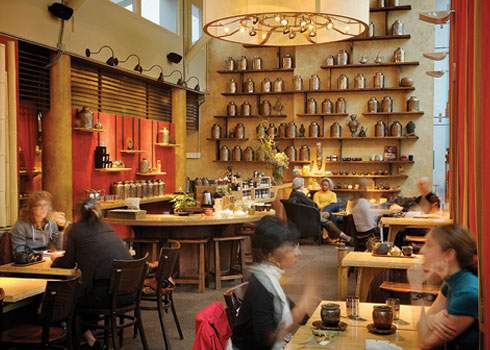Being “connected” nowadays means you’re always plugged in. You’re phoning, texting, emailing, all the time, wherever you are. To Jesse Jacobs, who started Samovar in San Francisco, “connected” means something completely different, perhaps even the opposite. In fact, at Samovar’s three tea lounges wi-fi is decidedly unavailable. “If you want to really connect,” Jacobs says, “you have to disconnect.”
Jacobs grew up practicing meditation, yoga, and martial arts. His parents, Lenny and Barbara Jacobs, were publishers of the groundbreaking spiritual magazine East West Journal for almost twenty years. They provided an early example of the kind of social entrepreneurship exemplified by Samovar. After graduating from college, Jacobs went to work in high-tech, an easy step for someone in the cyber generation. “But after about four years,” he says, “I found myself totally disconnected from myself and other people. I was working on a dreary project in Seattle, looking out over a sea of cubicles. One day I was drinking a cup of Oolong tea from Taiwan called Monkey Picked Iron Goddess of Mercy that a friend had given me. It was delicious and aromatic and I suddenly paused completely. That’s when it came to me. I needed to do something where there was much more connection. And what a great thing to revolve it around: tea.”
“Tea culture” had been part of Jacobs’ life since childhood and he came to appreciate the ritual of its preparation and serving. It slows people down. There are many places in the world where before anything else happens, tea is served. “Coffee’s good for a quick jolt and go,” he says, “but when people meet over tea, you will see something different, less kinetic and frenetic. It grounds you.”
Eight years ago, Jacobs opened his first location, on the edge of the Castro district near Mission Dolores Park in what was widely thought to be a dead location. A coffee shop had just closed there. “We also came in for a lot of criticism for our no wi-fi policy on yelp.com, the restaurant rating site,” he says, “but slowly people started to come around to what we were doing.” It was so successful that several years later the city invited Samovar to open downtown in the Yerba Buena Center for the Arts, in an abandoned Starbucks. In 2009, Samovar’s third location opened up on Page Street, catacorner from the San Francisco Zen Center, in another former coffee shop.
Samovar is known for its broad selection of teas, served by staff who can give you the story behind each of them, and also offers unique and tasty food, so the lounges have become prime places to meet and greet and share a meal. Jacobs has capitalized on the recognition by holding talks and tastings and performances there. He also fosters partnerships with like-minded groups. Samovar recently released a new tea, Zen Mind, that will help support Zen Center. On his companion website, realritual.com, he’s doing a series of video interviews of values-driven entrepreneurs. The company’s website (samovarlife.com)also provides a rich offering of thoughtful ideas and products.
For Jacobs, human connection is the central value in the business. In his view, it extends to how he works with managers, staff, customers, and suppliers, so everyone feels they’re an organic part of the whole. “We are a values-based business. My vision is that everything surrounding the simple ritual of serving tea is connected. We connect the customer to the server to the farmers who grew the leaves. We know where all our tea comes from and we have relationships with those people. There are no mega-agribusinesses involved here.”
Jacobs has a young son now, so he’s very attentive to the need to disconnect in order to connect. “It’s so easy to get consumed and just never stop working, always responding, never coming from a deeper place. Right now I’m working on becoming a single-tasker. I try to take time with every message I send and keep focus. When I’m at work, I focus on that. When I’m home, I focus there. Meditation, yoga, and tai chi help. I just joined Zen Center and we’re making arrangements for the whole staff to become members as well.”
Photo: Samovar Tea Lounge at the Yerba Buena Center for the Arts, in downtown San Francisco.






